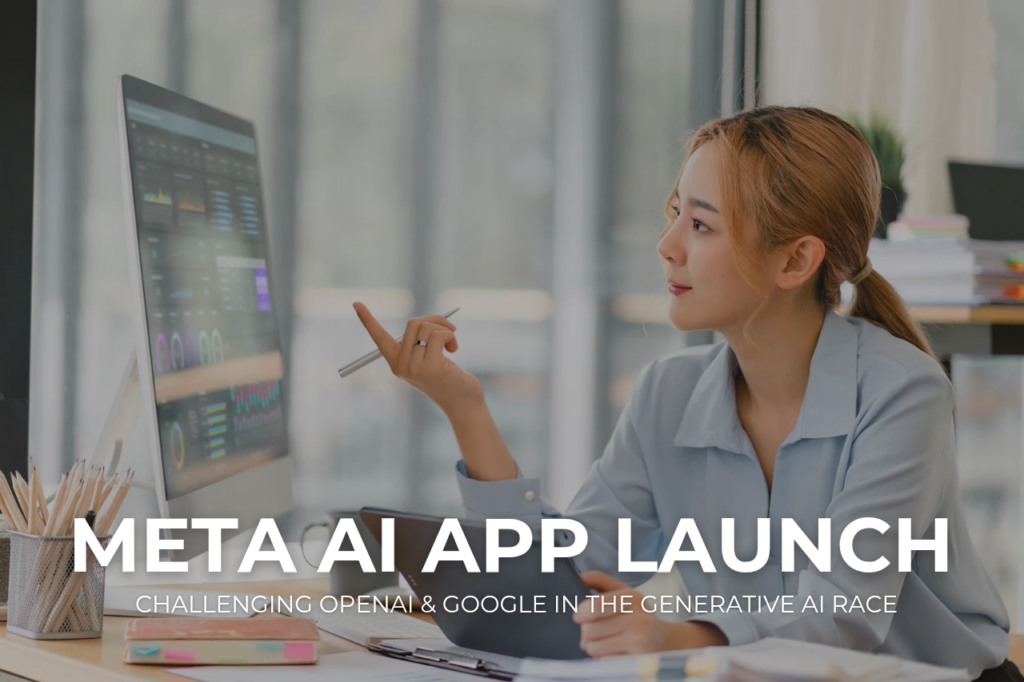Introduction
Meta Platforms, Inc. (NASDAQ: META) is passionate to disrupt the rapidly evolving generative artificial intelligence (AI) sector with the launch of a standalone Meta AI application in the second quarter of 2024, according to a CNBC report. This strategic move positions the social media titan in direct competition with established players such as OpenAI, Google’s Gemini, and Microsoft’s Copilot. With Meta’s vast user base and aggressive investment in AI infrastructure, industry analysts anticipate significant shifts in market dynamics as the company leverages its ecosystem to scale adoption.
The Generative AI Landscape: A Competitive Surge
The generative AI market has witnessed exponential growth since OpenAI’s ChatGPT debut in late 2022, catalyzing a race among tech giants to deploy consumer-facing tools. According to Grand View Research, the global generative AI market, valued at $13.2 billion in 2023, is projected to grow at a compound annual growth rate (CAGR) of 38.6% through 2030.
Key players like Google, Microsoft, and Amazon have since integrated AI across productivity suites, cloud services, and advertising platforms, while startups such as Anthropic and Elon Musk’s x AI vie for niche dominance.
Meta’s entry into this crowded field is notable not only for its timing but also for its existing infrastructure. Unlike competitors that rely on standalone platforms, Meta AI is already embedded across the company’s suite of apps – Facebook, Instagram, WhatsApp, and Messenger reaching 700 million monthly active users as of January 2024.
CEO Mark Zuckerberg emphasized on the Q4 2023 earnings call that Meta AI could scale to 1 billion users by year-end, a milestone that would dwarf ChatGPT’s reported 100 million weekly users.
Strategic Monetization and Market Penetration
Meta’s reported exploration of a paid subscription model aligns with broader industry trends toward monetizing advanced AI features. OpenAI’s ChatGPT Plus ($20/month) and Google’s Gemini Advanced ($19.99/month) exemplify the “freemium” approach, offering premium capabilities like enhanced reasoning and customization. For Meta, a subscription tier could unlock revenue streams beyond its ad-driven model, which accounted for 97.5% of its $134.9 billion revenue in 2023.
However, Meta’s ad-integrated ecosystem presents unique advantages. By embedding AI tools into social and messaging platforms used by 3.98 billion people monthly, Meta can collect vast datasets to refine its models – a critical edge in training AI systems.
“Meta’s ability to leverage user interactions across its apps for real-time learning could accelerate its AI’s contextual understanding, potentially outpacing narrower competitors,” noted Sarah Smith, AI analyst at Gartner.
Financial Commitments and Investor Sentiment
To support its AI ambitions, Meta plans to increase capital expenditures to $60–65 billion in 2024, a 54–66% surge from $39 billion in 2023. This investment will bolster computational infrastructure, including Nvidia’s H100 GPUs and proprietary data centers. While such spending has raised investor concerns about short-term margins, Meta’s stock has risen 12% year-to-date, reflecting optimism about long-term AI-driven revenue opportunities.
CFO Susan Li underscored on the earnings call that AI is central to Meta’s roadmap, enhancing core products like Reels and click-to-message ads while laying groundwork for future innovations. Still, analysts caution that profitability hinges on seamless execution.
“Meta must balance monetization with user trust, particularly given regulatory scrutiny over data privacy and antitrust issues in the EU and U.S.,” warned James Crawley, senior analyst at Bloomberg Intelligence.
Challenges and Regulatory Hurdles
Meta’s AI push faces headwinds beyond technical execution. Regulatory bodies are increasingly scrutinizing AI ethics, misinformation risks, and antitrust concerns. The European Union’s Digital Markets Act (DMA) and AI Act could impose stringent rules on data usage and market dominance, complicating Meta’s integration strategies. Additionally, the company’s historical controversies over user privacy may deter adoption of paid AI services.
Industry Predictions and Implications
Market experts suggest Meta’s foray could reshape the AI landscape in three key ways:
- User Accessibility: By bundling AI tools with widely used apps, Meta democratizes access to generative AI, particularly in emerging markets where WhatsApp and Instagram dominate.
- Advertising Synergies: Enhanced AI capabilities may improve ad targeting and ROI, further solidifying Meta’s lead in digital advertising.
- Ecosystem Lock-In: Integrated AI services could increase user retention across Meta’s platforms, creating a feedback loop that strengthens its ecosystem.
Opinion
Meta has the scale and resources to disrupt generative AI, but its legacy of trust issues and regulatory battles will be its Achilles’ heel. To truly compete with OpenAI and Google, Meta must prioritize transparency and user-centric design – not just algorithmic prowess. The coming year will reveal whether Zuckerberg’s vision of an AI-driven metaverse is revolutionary or merely aspirational.
In an industry where hype often outpaces reality, Meta’s greatest challenge may not be technological, but philosophical: Can a company built on social media’s attention economy reinvent itself as a leader in ethical, user-first AI? The answer will shape not just Meta’s future, but the trajectory of the entire digital landscape – Kiran Kashif




